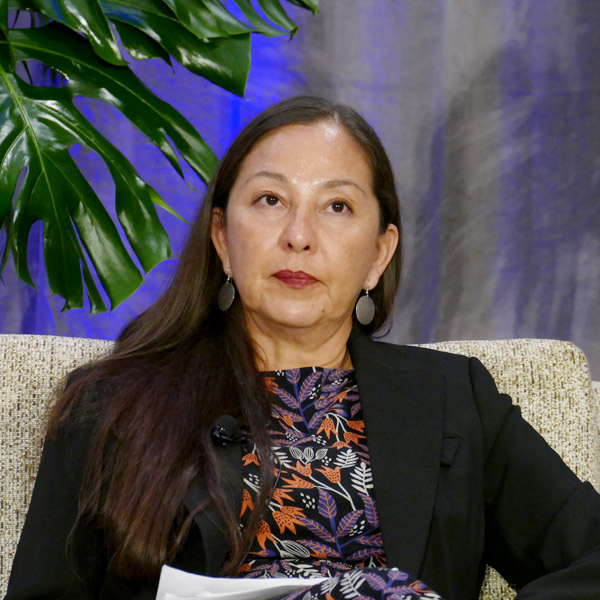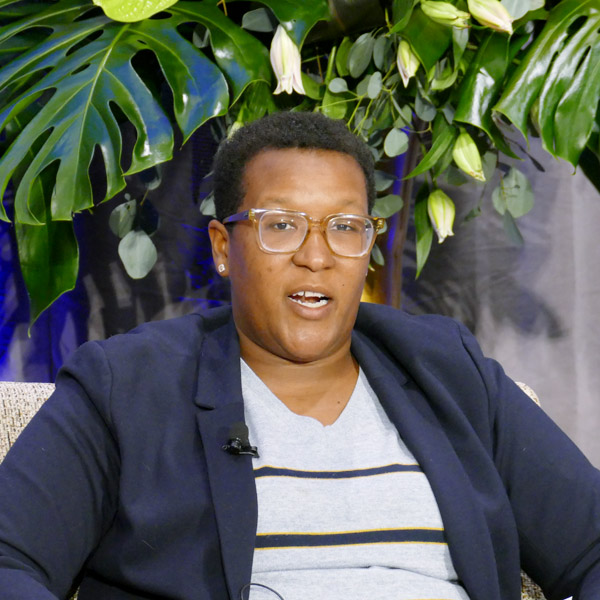
WASHINGTON — Nicole Horseherder, a member of the Navajo Nation, began working to ensure a just transition for her tribe about five years ago, after learning that the 2.5-GW Navajo Generating Station would close more than two decades earlier than planned.
 Nicole Horseherder, To Nizhoni Ani | © RTO Insider LLC
Nicole Horseherder, To Nizhoni Ani | © RTO Insider LLC“When we started, it was an uphill battle. I don’t think anyone really knew what a just and equitable transition was. And the utilities opposed our proposals, as did consumer groups and the [Arizona Corporation Commission] staff,” she said. But after learning how to intervene in the ACC’s proceedings and winning funding from Arizona Public Service (NYSE:PNW), “it looks like the road to just and equitable transition is possible,” Horseherder told the National Association of Regulatory Utility Commissioners’ Winter Policy Summit on Feb. 14.
Cara Goldenberg, a manager at RMI (formerly Rocky Mountain Institute), also has seen progress. Last year, she said, at least five states — Colorado, Illinois, Maine, Massachusetts and Oregon — passed “legislation to require, or explicitly authorize,” public utility commissions or other agencies to consider equity in decision-making.
“But even without legislation, regulators are already taking action,” said Goldenberg, who joined Horseherder and others on a panel discussion moderated by Wyoming Public Service Commissioner Mary Throne and Ohio Public Utilities Commissioner Beth Trombold.
“We’ve seen commissions create new staff positions or teams to focus on equity explicitly. We’ve seen states use performance-based regulation and planning processes to encourage utility efforts to evaluate distributional impacts of their investments, improve program design and targeting [to] benefit low- to moderate-income customers; and increased visibility and utility accountability on important equity metrics. We are also seeing commissions explore new ways to reach beyond intervener compensation and encourage effective collaboration and effective stakeholder participation from groups that haven’t traditionally been part of the regulatory process before.”
3,000 Jobs
Horseherder, executive director of Tó Nizhóní Ání (“Sacred Water Speaks”), a Navajo environmental organization, became engaged with Arizona regulators in 2017, with her group intervening in two proceedings. “Our goal is to ensure that utilities that own the plants are not allowed to just walk away. Instead they need to provide some kind of support to the communities that they profited from for half a century,” she said.
The Navajo Generating Station, the largest coal plant in the western U.S., closed in November 2019, and three other coal plants on or adjacent to Navajo land are scheduled to shut down within nine years. The plants had a combined capacity of more than 5,000 MW and employed about 3,000, most of them Native American workers.
“They are easily the highest paying [jobs] in the region, and for about 50 years, the power plant and the [Kayenta coal] mine were the economic foundations in northern Arizona,” Horseherder said. “The decision to shut them down so abruptly wiped away about $50 million of the Navajo Nation’s annual revenues and about 85% of the Hopi Nation’s tribal budget.”
APS, part owners of the Navajo plant and two of the other coal plants, reached an agreement to provide the Navajo Nation, Hopi Tribe and Navajo County $144 million to ease the post-coal transition. But the ACC last year reduced the funding to $10 million for the Navajo Nation alone, expressing concern that the deal would have been funded by ratepayers rather than APS shareholders.
Horseherder said the Arizona commissioners — who are elected statewide and serve four-year terms — see their stakeholders as only ratepayers and utilities.
The residents of communities where coal-fired generators are located may not be ratepayers, she said, and “are far removed from the cities in which the Corporation Commission is situated [Phoenix and Tucson]. And I think that’s the disconnect: that there’s people out there that they’re impacting that never even get to the radar.”
‘Learning Curve’ for Welfare Rights Org
Also joining Horseherder on the panel was Briana Parker, an organizer for the Detroit-based Michigan Welfare Rights Organization, who said the group has found it a challenge to engage with the Michigan Public Service Commission.
 Briana Parker, Elevate and Michigan Welfare Rights Organization | © RTO Insider LLC
Briana Parker, Elevate and Michigan Welfare Rights Organization | © RTO Insider LLC“There’s lots of barriers, because we don’t understand [regulatory rules],” she said. “So while we’re there, it’s not meaningful, because, you know, the outcomes aren’t there; we’re just having conversations. … Having the utilities and commissions and nonprofit organizations that are already at the table all work together is how we can get to meaningful involvement, because there’s a learning curve.”
Wade Buchanan, director of the Colorado Office of Just Transition, who participated remotely, said community groups can find themselves outgunned in what is “a regulatory, legalistic process.”
“My observation is if you’ve got a good lawyer, you’ll get heard. And if you don’t have a good lawyer, you aren’t necessarily going to be heard,” he said.
Goldenberg said environmental justice and equity issues are beyond the traditional purview of state consumer advocates. “As these new proceedings get initiated, [they] are focusing on really difficult issues — issues that we haven’t necessarily had to deal with in the past — and a lot of issues that have a very real people element to it,” she said. “I want to be sure that commissioners don’t think that just because the consumer advocate is participating, that they can sort of just check that box. I think it’s necessary to have those community-based organizations as well.”
Goldenberg suggested that commissions document stakeholder comments, and how they were addressed, in writing. “Just that simple documentation gives assurance to groups that they’re being heard,” she said.
After the legislative action last year, Goldenberg said she is excited for 2022.
“I think there’s a lot of precedent now to build upon,” she said. “Legislation might not be necessary for commissions to act on it. So, I would encourage commissioners to also think about what they can do … with their current authority to advance the issue. … I feel like [we have] only scratched the surface in terms of what is possible for making equity a true tenet of utility regulation.”



